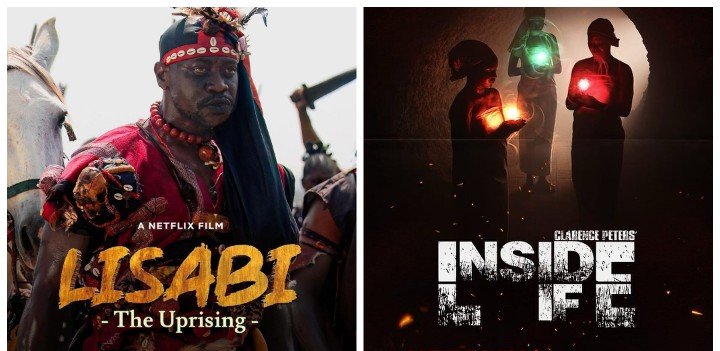Two Netflix movies from Nollywood
Source: Africa Publicity
African cinema, particularly Nollywood—the Nigerian film industry—has evolved remarkably from being a local form of entertainment to becoming a global cinematic powerhouse. This growth has not only provided a platform for African stories but has also redefined how African culture and experiences are presented on the international stage.
Early Beginnings of Nollywood
Nollywood’s roots can be traced back to the early 1990s, when the industry was largely informal, and films were shot on low budgets using VHS technology. The groundbreaking 1992 film Living in Bondage, directed by Chris Obi Rapu and produced by Kenneth Nnebue, is widely regarded as the movie that launched Nollywood. Its success, especially in telling relatable Nigerian stories, sparked the rise of a fast-growing film industry. Despite initial challenges such as limited infrastructure, minimal government support, and piracy, Nollywood became a thriving hub for low-cost, high-volume filmmaking.
Milestones in Nollywood’s Journey
1. The Rise of Digital Filmmaking (2000s)
As technology improved, Nollywood shifted from VHS tapes to digital filmmaking. This development reduced production costs and made it easier for filmmakers to produce films quickly. The early 2000s witnessed an explosion of Nollywood films across the continent, with movies becoming accessible in homes and on DVDs. Directors like Tunde Kelani and Amaka Igwe pioneered storytelling that reflected the richness of Nigerian traditions and modern life, reaching millions of viewers.
2. First International Acclaim (2007)
The mid-2000s saw Nollywood attracting international attention. In 2007, *The Figurine*, directed by Kunle Afolayan, was a critical turning point. The film’s high production values and unique narrative structure demonstrated that Nollywood could deliver films that met international standards. The Figurine won multiple awards and was screened at festivals worldwide, further cementing Nollywood’s credibility as a serious cinematic industry.
3. Netflix’s Entry into Nollywood (2015-2020s)
The advent of streaming platforms like Netflix provided Nollywood with an unprecedented global reach. In 2015, Netflix made its first major move into Nollywood by acquiring the film October 1, a historical thriller directed by Kunle Afolayan. In 2020, Netflix launched Netflix Naija, a dedicated Nigerian arm, signaling its commitment to expanding African content globally. This era also saw productions such as Lionheart (2018), directed by Genevieve Nnaji, becoming the first Nigerian film to be submitted for an Academy Award. Although it didn’t win, it showcased Nollywood’s ability to compete on an international level.
4. Major International Awards
The visibility of Nollywood increased significantly with films like The Milkmaid (2020), directed by Desmond Ovbiagele. It was Nigeria’s official entry for the Best International Feature Film category at the 2021 Academy Awards and earned critical acclaim for its compelling narrative on terrorism in northern Nigeria. Another key milestone was achieved when *Eyimofe* (2020), directed by the Esiri brothers, was selected for the prestigious Berlin International Film Festival, gaining widespread international recognition.
Key Films that Shaped Nollywood’s Growth
1. Living in Bondage (1992): The film that started it all, focusing on traditional Nigerian themes of spirituality and moral dilemmas.
2. The Figurine (2009): Directed by Kunle Afolayan, this psychological thriller became one of Nollywood’s first films to break into international markets.
3. October 1 (2014): A historical drama set against the backdrop of Nigerian independence, showcasing Nollywood’s move towards high-budget, quality filmmaking.
4. Lionheart (2018): Directed by Genevieve Nnaji, this Netflix-acquired film became a global success and was Nigeria’s first Oscar submission, signaling Nollywood’s arrival on the global film scene.
5. The Milkmaid (2020) : A vivid portrayal of terrorism’s impact on women, earning critical recognition worldwide.
Influential Directors
Tunde Kelani
A veteran filmmaker known for using traditional Nigerian stories and folklore, Tunde Kelani is celebrated for blending modern themes with cultural narratives. Films like *Thunderbolt* (2000) and *Maami* (2011) have solidified his place as a storytelling master in Nollywood.
Kunle Afolayan
Known for pushing the boundaries of Nollywood, Kunle Afolayan’s films are renowned for their high production values and unique storylines. With films like The Figurine and October 1, Afolayan has helped shape Nollywood’s global image.
Genevieve Nnaji
As a prominent actress turned director, Genevieve Nnaji made history with Lionheart as the first Nigerian film to be acquired by Netflix. Nnaji’s work represents a modern wave of Nollywood filmmakers who are expanding the industry’s reach globally.
Kemi Adetiba
Kemi Adetiba, known for her directorial debut The Wedding Party (2016), created one of the highest-grossing Nollywood films of all time. Her sequel, King of Boys (2018), showcased a dynamic range of storytelling and received international recognition.
The Future of Nollywood
Nollywood’s future looks promising as it continues to mature in terms of storytelling, production quality, and global outreach. Platforms like Netflix and Amazon Prime have already identified the potential of the industry, making strategic investments in African content. With government support, international collaborations, and increased technical expertise, Nollywood is poised to become a critical part of the global entertainment ecosystem.
Furthermore, the emergence of Nollywood-focused film festivals, such as the NollywoodWeek Paris Film Festival, highlights the growing interest in African cinema globally. These platforms not only celebrate African talent but also provide a space for cross-cultural collaborations between Nollywood and other international film industries.
Conclusion
From its humble beginnings as a local entertainment hub to its rise as a global cinematic force, Nollywood’s journey has been nothing short of remarkable. Key films and directors have played significant roles in shaping this trajectory, while technological advancements and international partnerships continue to boost the industry. As Nollywood expands its reach across the globe, it remains a vital cultural expression of African stories, voices, and experiences, influencing the broader film industry worldwide.








